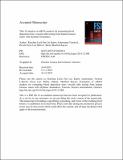Evaluation of mRNA markers for estimating blood deposition time : towards alibi testing from human forensic stains with rhythmic biomarkers
Abstract
Determining the time a biological trace was left at a scene of crime reflects a crucial aspect of forensic investigations as - if possible - it would permit testing the sample donor's alibi directly from the trace evidence, helping to link (or not) the DNA-identified sample donor with the crime event. However, reliable and robust methodology is lacking thus far. In this study, we assessed the suitability of mRNA for the purpose of estimating blood deposition time, and its added value relative to melatonin and cortisol, two circadian hormones we previously introduced for this purpose. By analysing 21 candidate mRNA markers in blood samples from 12 individuals collected around the clock at 2 h intervals for 36 h under real-life, controlled conditions, we identified 11 mRNAs with statistically significant expression rhythms. We then used these 11 significantly rhythmic mRNA markers, with and without melatonin and cortisol also analysed in these samples, to establish statistical models for predicting day/night time categories. We found that although in general mRNA-based estimation of time categories was less accurate than hormone-based estimation, the use of three mRNA markers HSPA1B, MKNK2 and PER3 together with melatonin and cortisol generally enhanced the time prediction accuracy relative to the use of the two hormones alone. Our data best support a model that by using these five molecular biomarkers estimates three time categories, i.e., night/early morning, morning/noon, and afternoon/evening with prediction accuracies expressed as AUC values of 0.88, 0.88, and 0.95, respectively. For the first time, we demonstrate the value of mRNA for blood deposition timing and introduce a statistical model for estimating day/night time categories based on molecular biomarkers, which shall be further validated with additional samples in the future. Moreover, our work provides new leads for molecular approaches on time of death estimation using the significantly rhythmic mRNA markers established here.
Citation
Lech , K , Liu , F , Ackermann , K , Revell , V L , Lao , O , Skene , D J & Kayser , M 2016 , ' Evaluation of mRNA markers for estimating blood deposition time : towards alibi testing from human forensic stains with rhythmic biomarkers ' , Forensic Science International: Genetics , vol. 21 , pp. 119-125 . https://doi.org/10.1016/j.fsigen.2015.12.008
Publication
Forensic Science International: Genetics
Status
Peer reviewed
ISSN
1872-4973Type
Journal article
Description
This study was supported by grant 27.011.001 by the Netherlands Organization for Scientific Research (NWO) Forensic Science Program, Erasmus MC University Medical Center Rotterdam, by the EU 6th Framework project EUCLOCK (018741), UK Biotechnology and Biological Sciences Research Council (BBSRC) Grant BB/I019405/1, and by a previous grant from the Netherlands Genomics Initiative (NGI)/Netherlands Organization for Scientific Research (NWO) within the framework of the Forensic Genomics Consortium Netherlands (FGCN). D.J.S. is a Royal Society Wolfson Research Merit Award holder.Collections
Items in the St Andrews Research Repository are protected by copyright, with all rights reserved, unless otherwise indicated.

